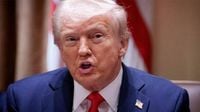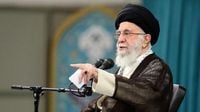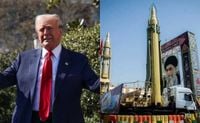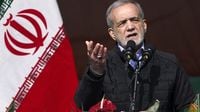DUBAI, United Arab Emirates (AP) — Iran’s President Masoud Pezeshkian announced on Sunday, March 30, 2025, that the Islamic Republic has firmly rejected direct negotiations with the United States regarding its rapidly advancing nuclear program. This statement marks Iran’s first official response to a letter sent by U.S. President Donald Trump to Iran’s supreme leader earlier this month, which was delivered via Oman.
Pezeshkian's remarks came amid heightened tensions between the two nations, particularly following Trump’s unilateral withdrawal from the Iran nuclear deal in 2018, which had aimed to limit Iran's nuclear activities in exchange for sanctions relief. Since then, Iran has significantly ramped up its uranium enrichment, now producing uranium at near weapons-grade levels of 60% purity, a threshold only atomic-armed nations typically reach.
During a Cabinet meeting, Pezeshkian stated, “We don’t avoid talks; it’s the breach of promises that has caused issues for us so far. They must prove that they can build trust.” While he left the door open for indirect negotiations, progress has stagnated since Trump’s administration reimposed stringent sanctions as part of its “maximum pressure” campaign against Tehran.
In a related development, Trump reiterated his stance on March 30, threatening military action if Iran does not agree to a new nuclear deal. Speaking to reporters while traveling from Florida to Washington, he declared, “If they don’t make a deal, there will be bombing. It will be bombing the likes of which they have never seen before.” Trump also hinted at the possibility of reintroducing secondary tariffs on Iran and its trade partners if a deal is not reached.
Iran's Supreme Leader Ayatollah Ali Khamenei, addressing the escalating situation, warned that the U.S. would face a strong retaliatory strike if it acted on Trump’s threats. Khamenei stated, “The enmity from the U.S. and Israel has always been there. They threaten to attack us, which we don’t think is very probable, but if they commit any mischief, they will surely receive a strong reciprocal blow.” His comments reflect a broader sentiment of defiance within Iran’s leadership amid ongoing military threats from the U.S.
In the wake of Trump’s threats, Iran has reportedly readied its missile capabilities, with state media claiming that a significant number of these missiles are housed in underground facilities designed to withstand airstrikes. The Tehran Times reported that these missiles have the operational capability to strike U.S.-linked positions globally. This military posturing comes after Iran launched direct missile and drone attacks against Israel, which resulted in minimal damage but demonstrated Tehran's willingness to escalate the conflict.
Trump's letter to Iran, which arrived on March 12, 2025, urged for negotiations and warned of dire consequences should military action become necessary. He was quoted saying, “I hope you’re going to negotiate because if we have to go in militarily, it’s going to be a terrible thing.” This letter echoes past efforts Trump made to engage with North Korean leader Kim Jong Un, which ultimately resulted in limited outcomes.
The backdrop to these tensions includes Iran's internal challenges, with the government blaming Western nations for recent unrest, including protests sparked by the death of Mahsa Amini in custody and widespread demonstrations over fuel price hikes in 2019. The Iranian leadership has consistently framed these external pressures as part of a broader strategy by the West to undermine the Islamic Republic.
As the situation evolves, the U.S. State Department has reiterated its commitment to preventing Iran from acquiring nuclear weapons. They stated, “President Trump has been clear: the United States cannot allow Iran to acquire a nuclear weapon.” This statement underscores the administration's hardline stance against Iran's nuclear ambitions.
Despite the ongoing threats and rhetoric, the reality remains that Iran has shown little willingness to engage directly with the U.S. under the current administration, especially given the historical context of Trump's previous actions, including the assassination of Iranian General Qassem Soleimani in a drone strike in January 2020. This event has left a lasting impact on U.S.-Iran relations and continues to fuel mistrust.
In conclusion, the rejection of direct negotiations by Iran, coupled with Trump's military threats and the potential for renewed sanctions, sets the stage for a precarious diplomatic landscape. As both sides navigate this tense standoff, the risk of escalation remains high, with regional stability hanging in the balance.








